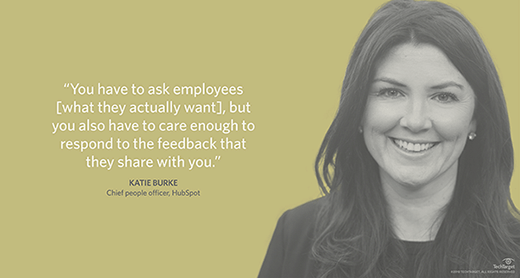Secrets of winning at your employee experience strategy
Marketing software company HubSpot has landed on numerous best places to work lists, but press about its workplace hasn't been all rosy. CPO Katie Burke shares thoughts on both.
HubSpot, the Massachusetts-based company known for marketing and sales software, has been listed as a top place to work by Fortune, Boston Business Journal and Glassdoor, among others. For HubSpot's head of HR, Chief People Officer Katie Burke, the Glassdoor award is particularly special because it's "rooted in employee feedback."
Still, the company is not job nirvana for all. Like many tech companies, HubSpot struggles with diversity issues. HubSpot's most recent diversity report at the time that this article was published, from January 2017, claimed 1,529 worldwide employees, largely white (85%) and in the 35-and-under age bracket (89%). As to the latter, a reported bias toward younger workers was a core issue raised in a memoir written by a disgruntled ex-employee. In addition, the company was one of the subjects of an article criticizing the use of age-targeted Facebook ads.
Burke, who is the first woman in the C-suite at HubSpot and who has written specifics about the company's diversity efforts, responded to questions about that negative press, what the company learned as a result and why uncovering the real views of your workforce holds the key to getting your employee experience strategy right.
An adaptive employee experience strategy
How would you define employee experience?
Katie Burke: In my view, the employee experience is how someone would articulate their experience at your organization -- including the good, the bad and everything in between -- to someone when no one from your team is watching.
What advice do you have for other companies on improving their employee experience strategy?
Burke: I think most companies start by adding tools, and many companies start by trying to figure it out in the C-suite. The best approach to identifying what your employees want requires actually taking the time to ask them. But the second part of the equation is equally as important. Tons of companies ask for [employees'] opinion[s], but then, when employees tell them, 'Hey, this isn't working,' leadership ignores that, they redact everything they don't agree with and then they agree to do two small things that don't actually matter. You have to ask employees, but you also have to care enough to respond to the feedback that they share with you.

On a more difficult note, a December 2017 article, copublished by ProPublica and The New York Times, wrote that a number of companies, including HubSpot, were using age-targeted Facebook ads, which, by definition, were excluding older workers. As people analytics becomes more sophisticated, companies are both able to target their recruitment efforts, for example, but on the flipside, there's this inherent danger in doing so. Can you say a few words, both about the lessons learned from that and more broadly about people analytics?
Burke: One thing I'm proud of is that we've owned the experience. We've said, 'Hey, this was a learning experience for us. We're trying to figure out global ad targeting as we go as a company, and this was a mistake, and we've erased it from all of our processes.' So, we no longer use age targeting in any way, shape or form as part of marketing our job descriptions or any openings here at HubSpot.
What I will say is that all of our jobs are open to anyone and that we take great pride in the equality with which we approach those openings. So, for example, the listings that you referenced were all advertised on multiple platforms open to any candidate, including the HubSpot jobs page, Ladders, Indeed and other channels where anyone could apply.
I think anyone who has a people analytics bent has an obligation to regularly see what's working, what isn't … and take stock of where you can learn and grow. And so, we're always … making a commitment to making HubSpot even better as we grow.
Diversity, inclusion and employee experience strategy
In what ways does tech enable you to accomplish goals around diversity?
Burke: Tech certainly provides me with good insight into feedback on what's working, what isn't, both in the candidate and the employee experience. I think that what many people overlook about diversity and inclusion work is that diversity is really just that part of what your organization looks like from a demographic perspective. Inclusion is how welcoming your employee base and employee experience feels to all of your employees. And so, what we use on a regular basis is our employee Net Promoter Score survey, which gives us a lot of really valuable feedback on pockets of the organization where we hope to improve as it relates to inclusivity, areas that are really working, managers that are really prioritizing that so we can make sure that we call out and reward [the appropriate people]. We also use data to make sure that we're always optimizing and improving and publish diversity data once a year to keep ourselves really transparent about the progress we're making on that front.
In terms of getting hard feedback, is there an example you can share where you got feedback that was difficult for people to get their minds around but that prompted some sort of change?
Burke: With scale, our employees were starting to feel more distant from our executive team's vision and approach. What we added as a result of that employee feedback was more sessions with our leadership team where employees could ask tough questions, where they could share things that were top of mind for them that we call spotlight sessions. And that was not fun or enjoyable for any of our executive team to hear, but it was really important that we not ignore it and we act on it. So, this is the type of action that we try to take … [that] allows us to make changes before something systematically breaks.
Bad press as a learning experience
On the subject of tough feedback, in 2016, the book Disrupted was published. Written by a former employee, it took a negative view of HubSpot's culture. Most companies don't deal with that level of press for a company's employee experience, but many companies do deal with word of mouth that can be less than positive. What HR strategy or employee experience strategy advice would you give to other companies in dealing with negative events like that, and in what ways did it affect strategy?
Burke: Anyone who works at your organization -- past or present -- can give you tangible lessons, both good and bad, that you can learn from, and one of the things I'm most proud of as it relates to the book is how our founders reacted. Their LinkedIn post really took the high road. It shared things that we were going to meaningfully improve, based on the feedback from the book. It defended some of our principles that they believe were misinterpreted or misrepresented in the book. But then, most importantly, it shared with our employees what our vision for their experience was going to look like moving forward. I don't think any company or any culture is perfect. So, all you can do is commit to learning and growing and improving at every turn. And that's what we've chosen to do.
We've had hundreds of employees share positive experiences on their feedback at HubSpot … but not every single person loves their experience. Unfortunately, Dan [Lyons, the author] had a less-than-stellar experience, and obviously, his book reflected that. But I'm really proud of how we've galvanized support for how we're going to improve moving forward, changes that we've made to ensure that we're addressing that feedback and that we're being really transparent with our employees about the fact that we're open to that feedback and improving from it.
Employee experience strategy gets transparent
Anything else that's important to mention as a last note?
Burke: I think the proliferation of technology and social media makes it more imperative that HR departments be more transparent. So, be willing to share what you're working on; be a bit more embedded in the business operations. I think [this is important] in order for HR to be more relevant and strategic.







